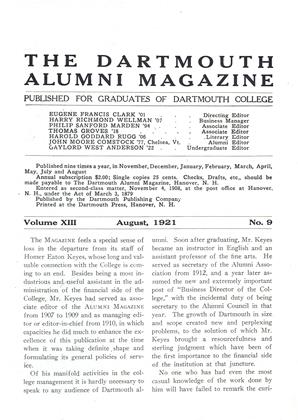Old World Traits Transplanted, by Robert E. Park, Professional Lecturer, University of Chicago, and Herbert A. N. Miller '99, Professor of Sociology, Oberlin College. Harper Brothers, New York and London, 1921. Pp. 308.
The peculiar merit , of this little book, of which Professor Miller is joint author, is its outstanding realism. It does not content itself with discussions about the immigrant, but gives in vivid, appealing fashion, his very mind and heart revealed in copious citations from immigrant narratives, autobiographies, letters to our foreign press, and similar sources. The materials from which these selections were made, amounting to some 20,000 documents for the Jewish and Polish groups, and fewer for the other races, were gathered by the Division of Treatment of Immigrant Heritages of Studies in Methods of Americanization, which was financed by the Carnegie Corporation of New York.
To the average American of native stock, feeling himself rather uncomfortably remote from the foreign-language groups in our midst, this book, opens a real door to that America within America about which our professional Americanizers talk so earnestly, and often know so little. All efficient endeavor in every field waits upon insight into the processes which are at work. Here is a study which shows genuine understanding of the conditions of the problem of Americanization. I know of no better discussion in brief compass of the philosophy of assimilation than the admirable closing chapter, entitled "Reconciliation of the Heritages."
Under "Tolerance Versus Suppression," the authors write: "A wise policy of assimilation, like a wise educational policy, does not seek to destroy the attitudes and memories that are there, but to build on them.
"There is a current opinion in America, of the 'ordering and forbidding' type, demanding from the immigrant a quick and complete Americanization through the suppression and repudiation of all the signs that distinguish him from us. Those who have this view wish the repudiation to be what the church fathers demanded of a confession of sin sudden, complete, and bitter.'
'It is notable that this destruction of memories is the plan of both those who demand a quick and complete Americanization and those who demand a quick and complete social revolution —the extreme Americanists and the extreme radicals. In the anarchist-communist manifesto (document 76, p. 100) we read: We must mercilessly destroy ... We must care that everything is wiped out from the earth that is a reminder.' Both positions imply that there is nothing of value for the future in the whole of past experience"; (pp. 280-1).
Like all books with citations from many writers, this one affords evidence here and there of the difficulty of maintaining unity; yet in the very variety of the experiences which are portrayed with their pathos and their humor, their degeneration, tragedy and nobility, the reader is enabled to practice a fruitful sociological method—that of "sympathetic introspection." Through the immigrant's own eyes we may visualize the America that is seen from the steerage, the Ghetto and the foreign industrial quarter.
In a democracy a maximum of mutual understanding is a prime desideratum; in proportion as we learn to understand the immigrant from interpretations such as this will we succeed in enlisting the full strength of his loyalty in behalf of essential Americanism.
ERVILLE B. WOODS.
Wm. H. Brown 'l6 is the author of "Teaching of the History of Electrolytic Dissociation in High School Chemistry in the May issue of School Science and Mathematics.
The Philadelphia Public Ledger has been running an interesting series of articles on Poland by Eric P. Kelly '06.
'All Alone in the Country," by Henry Bailey Stevens '12 appears in the GraniteMonthly for June.
Thorndyke Saville '14 is the author of "The Relation of Water Resources to Forestry" and "The Water Powers of North Carolina," issued as Press Bulletins 172 and 175 of the North Carolina Geological and Economic Survey.
John Cotton Dana '78 is the author of Libraries and Museums," which appears in the issues of the Library Journal for May IS and June IS. Mr. Dana is also the author of "A Plan for a New Museum; the Kind of Museum it will Profit a City to Maintain," published by the Elm Tree Press, Woodstock, Vt.
"Evered," the latest novel by Ben Ames Williams '10, is published by the E. P. Dutton Co. This will be reviewed in a later issue of the MAGAZINE.
 View Full Issue
View Full Issue
More From This Issue
-
 Article
ArticleCOMMENCEMENT 1921
August 1921 -
 Article
ArticleTHE UNPROVABILITY OF MAN
August 1921 By ERNEST MARTIN HOPKINS -
 Article
ArticleThe MAGAZINE feels a special sense
August 1921 -
 Class Notes
Class NotesCLASS OF 1876
August 1921 By HENRY H. PIPER -
 Article
ArticleEXTRACT FROM RECORDS OF TRUSTEES' MEETING, JUNE 20, 1921
August 1921 -
 Class Notes
Class NotesCLASS OF 1911
August 1921 By N. G. BURLEIGH
Erville B. Woods
-
 Article
ArticleALUMNI PUBLICATIONS
April, 1915 By ERVILLE B. WOODS -
 Books
BooksFarmers and Workers in American Politics
March 1925 By Erville B. Woods -
 Books
Books"Old Dartmouth, an Appealing New Trend in College Room Decoration"
December, 1925 By Erville B. Woods -
 Books
BooksMan and Society.
NOVEMBER 1927 By Erville B. Woods -
 Books
BooksTHE BEGINNINGS OF TO-MORROW
May 1933 By Erville B. Woods -
 Books
BooksSOCIAL DISORGANIZATION
May 1941 By Erville B. Woods
Books
-
 Books
BooksCOMBO: USA. EIGHT LIVES IN JAZZ.
JUNE 1971 By CHARLES E. BREED '51 -
 Books
BooksFLETCHER, BEAUMONT & Cos.,
May 1947 By E. Bradlee Watson '02 -
 Books
BooksT AS IN TRAPPED,
January 1948 By HERBERT F. WEST '22. -
 Books
BooksTHE UNITED STATES MARINE CORPS.
NOVEMBER 1967 By MAJOR ERIC H. WIELER, USMC -
 Books
BooksANALYTIC GEOMETRY.
December 1936 By Robin Robinson '24 -
 Books
BooksDeepening Interdependence
April 1976 By THEODORE C. ACHILLES


